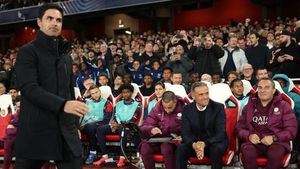In a striking response to recent speculation about her physical appearance, Egyptian actress Mai Omar took to social media to dispel rumors suggesting she underwent liposuction. On April 29, 2025, Omar shared images from her gym workouts on Instagram, emphasizing her commitment to health and fitness amidst the swirling gossip. The actress, who recently made headlines for her appearance at the wedding of Leila Ahmed Zaher, showcased her toned physique, which led some followers to question whether her transformation was the result of surgical intervention or a rigorous diet plan.
Omar's swift rebuttal to the liposuction claims came during a time when her public image was under scrutiny. "I focus on my health and physical fitness," she stated, aiming to clarify misconceptions about her body. This public declaration of her fitness journey coincided with her rising popularity on Twitter, where she also discussed her future projects.
Looking ahead, Mai Omar revealed her plans to participate in the 2026 Ramadan marathon with a new drama series, marking a collaboration with a director for the first time. This announcement has generated excitement among her fans and industry peers alike, especially following the success of her previous series, "Esh Esh." The show, which features a star-studded cast including Majed Al-Masry, Khaled Al-Sawy, and Shaimaa Seif, tells the story of a beautiful and intelligent girl named "Esh Esh" who navigates the complexities of life and dance, ultimately uncovering dark family secrets.
In addition to her professional endeavors, Mai Omar's recent social media activity has sparked discussions about body image and the pressures faced by public figures. As she continues to engage with her audience, her transparency about her fitness routine and upcoming projects highlights the dual challenges of maintaining a public persona while addressing personal health.
Meanwhile, Morocco is grappling with its own set of challenges, particularly concerning academic freedom. According to the "Academic Freedom Index" for 2025, issued by the F-Dem Institute and the University of Friedrich-Alexander Erlangen-Nuremberg, Morocco remains among the countries with significant academic freedom issues, ranking within the lowest 40-50 percent globally.
The report reveals that Morocco shares this unenviable position with nations like Senegal, Somalia, Maldives, and Liberia, indicating a troubling environment for academics and researchers. The index evaluates 179 countries and regions and relies on a comprehensive methodology that includes standardized surveys and precise statistical data.
In the context of the Arab world, the report highlights the pervasive restrictions on academic research and teaching across many Arab nations, including Morocco. The findings point to a worrying trend where countries that have experienced popular uprisings, such as Egypt, Syria, and Palestine, have seen their academic freedom ratings decline significantly.
Furthermore, the report notes that 34 countries have experienced a noticeable decline in the freedom of research and education over the past decade, while only eight countries have achieved any significant improvements. This downward trend is closely linked to rising economic and political pressures that stifle academic inquiry.
As the index continues to evolve since its inception in 2017, it serves as a critical resource for understanding the state of academic freedom worldwide. It underscores the structural challenges that academics face, including government interference in university affairs, legal restrictions on free expression, and the diminishing independence of academic institutions.
In light of these challenges, the report calls attention to the need for effective protections for academics and the dangers posed by a culture of self-censorship within universities. This environment not only restricts academic freedom but also hampers intellectual creativity and scientific progress.
As both Mai Omar and the Moroccan academic community navigate their respective challenges, their stories highlight broader societal issues—one reflecting the personal struggles of public figures amidst scrutiny, and the other illustrating the critical need for academic freedom in fostering a vibrant intellectual landscape. These narratives resonate with audiences, emphasizing the importance of health, both physical and intellectual, in shaping public discourse.




